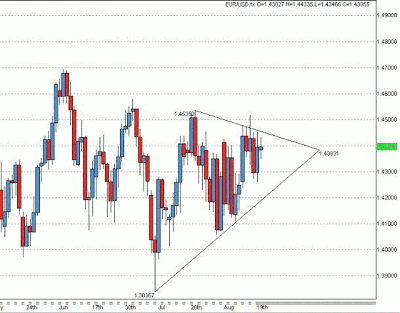Slow economic activity and declining business and investor confidence are weighing down the euro, but possible action by the Federal Reserve could spark a new rally in the EUR/USD currency pair.
The dog days of summer are finally here! August is typically one of the quietest months in the financial markets, but volatility has ripped through currencies, equities, and commodities over the past few weeks, forcing traders to forego their vacations to manage their positions. Investors should finally have an opportunity to relax this week thanks to lack of market-moving US data.
The only major US event risk is the Federal Reserve's Jackson Hole Summit at the end of the week, and the prospect of calmer markets in the beginning of the week has lifted currencies and equities. The rally can be sustained as long as there is no bad news to trigger more volatility, but the global economy is not out of the woods, and for that reason, we don't expect anything more than a relief rally.
With Federal Reserve officials convening for their annual two-day central banker's summit at the end of the week, the price action in the markets reflects the hope that the Fed will offer additional support for the US economy. Many people believed that part of the reason why the Fed did not announce more quantitative easing (QE) earlier this month was because they wanted to have a deeper discussion about the best ways to stimulate the economy at their annual summit.
Based upon the strength of inflationary pressures in the US, however, investors will probably be disappointed. In all likelihood, the central bank will do nothing more than reassure the markets verbally that they will do all that they can to support the economy. However, verbal support without additional QE only goes so far; action, not words, is needed to stimulate the economy.
Meanwhile, the focus will remain on Europe for most of the week. In Germany, the support for a Eurobond is slim, which means that Europeans will need to look for alternatives to end the sovereign debt crisis. The abundance of European data this week over US data could highlight the troubles in the region.
The volatility in the global markets combined with the sovereign debt crisis on both sides of the Atlantic and the slowdown in global growth will make it difficult for the Purchasing Manager’s Index (PMI), the Indicator of Economic Sentiment (ZEW), and German economic business climate report (IFO) to show any improvements. In fact, we expect economic activity and investor and business confidence to deteriorate, which could weigh on the euro this week.
The following EUR/USD chart shows that the currency pair is setting up for a breakout:
If deteriorating economic data triggers a crisis of confidence in the euro, we could see a sharp breakdown in the currency. Alternatively, if risk appetite continues to improve and more investors bank on the prospect of additional QE from the Fed, the EUR/USD could revisit 1.45.
By Kathy Lien of KathyLien.com











